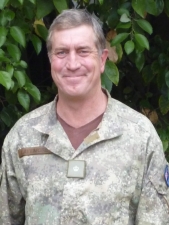Search

 Ian Lattimore. Photo Shirley Falloon.
Ian Lattimore. Photo Shirley Falloon.
While beginning my latest interview with Ian Lattimore, the first description that came to mind was ‘overachiever’ but I came to realise that Ian’s long and distinguished army career was motivated by his desire to, above all else, serve his country.
It was after some routine ‘fossicking’ on my part through the College Archives I frequently found photos and information of this high-profile student from the late 1970’s. I tracked ‘Latts’ down and found he is back living in the area just out of Methven.
Ian only attended Ashburton College for two years – 1979 and 1980 but made a significant impact in that short time. He came to College from Methven High (now Mt Hutt College) and when asked his reasons for transferring, he admitted that it was his broad sporting interests as much as the wider subject choices on offer that drew him to College. His rugby/leadership skills ensured that in 1980 he became captain of the 1st XV. He was also very keen on athletics and basketball. In that same year he became Head Boy also. He remembers his time at College very fondly and mentioned Bevan Bain, Trevor Cochrane, Pete Fougere as fantastic teachers/coaches as well as good friends. Daphne Thomson was head of Red House at the time that Ian was Red House captain. Mike Edsall was in charge of the shooting team that Ian took part in. Owen McDowell was Principal at the time and he and Ian shared a great rapport as well.
Half way through Ian’s 7th form (Year 13) year he decided to put his name forward for officer selection to the NZ Army. In 1981 Ian travelled to Officer Cadet School in Portsea, south of Melbourne where New Zealanders and Australians were trained. Ian’s upbringing was heavily influenced by a grandfather, great uncles, uncles and a first cousin all giving proud service to their country in three wars and by age eight, Ian had decided his future would be in this direction also.
During his time in Australia, he was trained by Vietnam ‘vets’ who he found “tough but very nice people”. After one year’s training he returned to New Zealand to attend the Platoon Commanders course in infantry at Waiouru.
His first posting (tour of duty) in 1983 was to West Germany with the British Army on the Rhine. He was posted to the famous Black Watch Scottish Regiment. This was during the Cold War period and that regiment was there primarily for surveillance and defence seeing no ‘action’ but serving a valuable purpose nevertheless. Ian returned to Burnham briefly before next being posted in 1984 to South East Asia, again during the Cold War.
In Singapore and now a lieutenant, Ian helped train the Malaysian Army where the relationship between New Zealand, Singaporean and Malaysian troops was, and still is, extremely close. While Ian would only touch on some of the high jinks soldiers sometimes got up to, it was as a result of him being on extra duty for some misdemeanour of his that he saved the arm of a fellow soldier. The surgeon operating on this fellow was prepared to amputate because of a shortage of his blood type but Ian would only sign the necessary consent form if the surgeon promised to wait until he had tracked down suitable donors from within his battalion.
In 1992 and 1993 Ian, now acting Major Lattimore went to Sinai as a liaison officer working with both the Egyptian and Israeli armies. Most of his time was spent in Cairo where he formed a great relationship with both.
After a stint in London on the British Military desk to Bosnia, Ian returned to NZ to work with at-risk secondary age and unemployed youth, then in 2002 Ian was sent to Sierra Leone, a place he describes as the “most upsetting of his career” because of the abuse of civilians he witnessed there. Living conditions for the local population were terrible and although the conditions for troops was much better, Ian lost 10kgs in a very short space of time. The heat, disease and working very long days for 7 months straight took its toll on the personnel there. He described the conditions there as being like a “white man’s graveyard”.
2004/05 found Ian on a tour of duty to Afghanistan as Ops Officer in the Bamiyan province. The NZ Army worked very closely with the US army, a partnership which was especially valuable to the much smaller body of NZ troops. Ian has nothing but praise for the US Army who was always there when back-up was needed and had the fire-power of ground attack aircraft and US Marines in helicopters at the ready. Living conditions and equipment for troops in Afghanistan were much better than Sierra Leone and it needed to be – temperatures sometimes plummeted to -35degrees. While in a mountainous area in blizzard conditions Ian needed to act fast to extract some personnel who were at risk. Even so they had suffered some frost nip!
2010-2011 saw Ian in Dilli, Timor in a peacekeeping role where he was an officer commanding NZ troops and Plans Officer for the ANZAC troops.
For three years Ian was a tactics and leadership instructor in Queensland. Ian is not quite retired but is back living on the family farm near Methven. His status is officially ‘stand-by Reserve’. He can be called back at any time. In the past he has escorted Royals and VIPs and particularly enjoyed escorting Prince Philip, Duke of Edinburgh. Others he has escorted are Princes Andrew and Edward, along with past Prime Minister Helen Clark. An important role Ian has undertaken is when the army was assisting with the Kaikoura earthquake and Invercargill floods.
One issue that army personnel are warned of when they have served in some very tough parts of the world is when they return is not to judge New Zealand people too harshly because they’ve not experienced the deprivation that people in conflict zones have.
Modest about his achievements, Ian was careful not to be drawn on some incidents and this is because he is still ‘serving’ and therefore governed by secrecy laws. Ian has life-long friends all over the world and stressed that army life “is a tough life but I would do it all again”.
By Shirley Falloon © AshColl Alumni - February 2020


